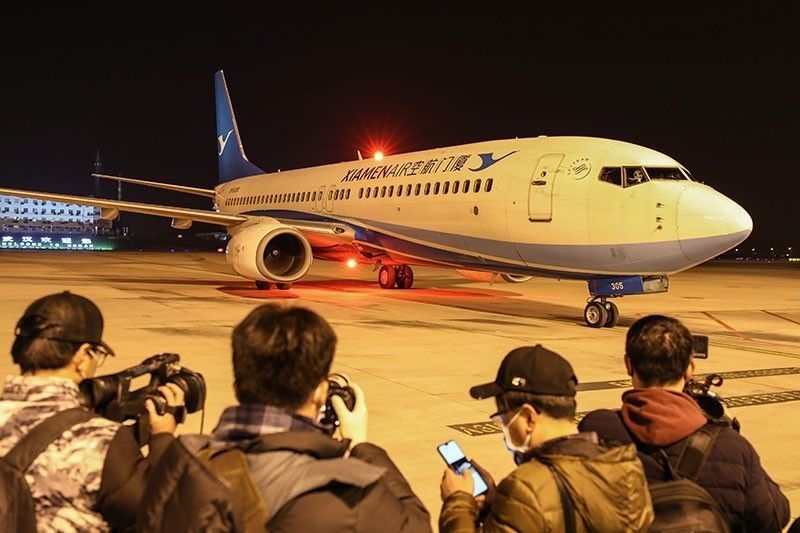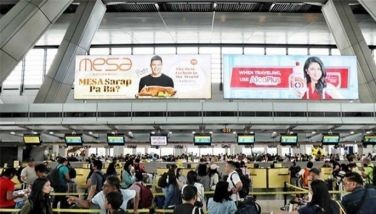Philippines early to adopt travel ban, lockdown but not first to do so

MANILA, Philippines — In a televised meeting announced Wednesday evening and aired past midnight on Thursday, government officials praised their own efforts against the COVID-19 pandemic, including travel bans and a "community quarantine" that is now also referred to as a lockdown.
Saying he had not been a "Johnny-come-lately" in addressing the threat posed by COVID-19—at the time called 2019-nCoV—President Rodrigo Duterte highlighted the community quarantine of the National Capital Region and later of all of Luzon to show that the government had been on top of the situation from the start.
"Ako ang pinakaunang lahat nag-lockdown kasi nasusundan ko na ang istorya," he said.
(I was the first among many to impose a lockdown because I was following the story.)
Duterte said he had studied different sources of information, including Facebook, to keep abreast of the developments on the pandemic.
'Lockdowns' elsewhere
The quarantine in Hubei province in China, which was in place since January 23, was lifted this week.
In the Southeast Asian region, Malaysia has been under a "Movement Control Order" restricting people to their homes since March 18 and Thailand began implementing a 10 p.m.-4 a.m. curfew only on April 3.
Indonesia declared a public health emergency on March 31 and has issued an order for "large-scale social distancing," the Jakarta Post reports while Vietnam has implemented a two-week ban on non-essential activities starting April 1.
Laos announced its own lockdown on March 29.
In Europe, Italy announced a lockdown on March 9 and Spain issued a "general confinement order" on March 14, Deutshe Welle reports.
France announced "a strict nationwide lockdown on March 17, banning all public gatherings and telling residents to stay inside except for grocery shopping and other essential tasks," DW also reports. A similar ban has been in place in Belgium since March 18.
Philippines' travel ban
Peace advisor Carlito Galvez Jr., chief implementer of the National Action Plan against COVID-19, added: "Nakita natin na maganda ang naging desisyon ng ating mahal na Pangulo na tayo ang pinakauna na nagkaroon ng tinatawag nating ‘yung travel ban sa mga bansa na nagkaroon ng COVID cases."
(We see that our beloved president's decision to be the first to implement a travel ban on nations that have had COVID cases was a good one)
Galvez said that the Philippines is reaping the good results of that “hard decision, desperate decision.”
But the Philippines was not the first to do so and calls for a travel ban had been mounting even before the government announced a ban, which initially only covered travelers from Wuhan City and Hubei province, the epicenter of the COVID-19 outbreak at the time.
Timeline of the Philippines' travel ban
- January 22: Rep. Rozzano Rufino Biazon (Muntinlupa) asks the Civil Aviation Authority of the Philippines to suspend direct flights from Wuhan, China to Kalibo, Aklan. On the said day, the new pathogen had infected at least 315 people and had killed at least six.
- January 23: The central China province of Hubei, where COVID-19 ground zero Wuhan City is located, is placed on lockdown. This effectively suspends flights and trains into and out of the city.
On the same day, the Civil Aeronautics Board says it would suspend all flights to and from Wuhan. - January 24: Immigration spokesperson Dana Sandoval says the bureau "has been denying applications for [visas upon arrival] for tour groups who will be flying in from Wuhan, following the announcement of the Civil Aeronautics Board to suspend all direct flights from Wuhan to the Philippines." VUA is a privilege for easier into the Philippines by tour groups and chartered flights.
- January 28: The Bureau of Immigration says it will suspend the issuance of visa upon arrival granted to Chinese tourists, in an effort to “slow down the influx of group tours.”
Immigration Commissioner Jaime Morente however said that there was otherwise no order barring Chinese nationals from entering the country. - January 30: Presidential spokesperson Salvador Panelo said the Philippines can ban flights from China, “because of the safety of our countrymen,” but would not do so yet.
“Unang-una, wala tayong iba-ban, hindi naman sila darating (In the first place, there is nobody to ban because they will not be arriving),” he said in the briefing. - January 31: Panelo announces that the Philippines is imposing a travel ban on Chinese nationals coming from Hubei and other places in China with COVID-19 cases.
"Upon the recommendation of [Health] Secretary Francisco Duque, the President has issued a travel ban to Chinese nationals coming from the Hubei province of China where the nCoV originated, as well as in other places in China where there is a spread of the disease," he says in a statement.
On the same day, the Health department announces the first COVID-19 case in the country—a 38-year-old Chinese woman who arrived from Wuhan City on January 21. - February 2: The Philippines expands travel ban to mainland China and its special administrative regions Hong Kong and Macau.
The Philippines' travel ban on China and its SARs briefly included Taiwan but the government has since reversed that decision. The ban on travel to China by Overseas Filipino Workers and students has also been relaxed.
Marshall Islands was the first to close its borders
US-based global think tank Council of Foreign Relations listed the Republic of Marshall Islands as the first country to impose an entry ban on travelers from China.
In a release dated January 24, the Ministry of Health and Human Services of the Republic of the Marshall Islands said travelers coming from, and transiting through, China “must spend at least 14 days in a country not affected” by COVID-19. If the traveler arrives in the Republic within the 14 days, entry will be denied. “No exceptions.”
A report from Reuters said North Korea closed off its borders from its neighbor China on January 25.
Hong Kong closed its borders to residents of and travelers from Hubei province on January 27. The ban did not cover Hong Kong residents.
Singapore imposes travel ban on January 29
Singapore's Ministry of Health said that effective noon of January 29, "all new visitors with recent Hubei travel history within the last 14 days, or those with [People's Republic of China] passports issued in Hubei, will not be allowed entry into Singapore, or transit through Singapore."
Singapore later expanded the ban to cover all new visitors with recent travel history to mainland China in the last 14 days at noon of February 1. Although it closed its borders early, Singapore only went into a lockdown this week after a jump in new infections in recent days.
"Authorities previously resisted the kind of draconian measures seen in worse-hit countries – but have now ordered the closure of all businesses deemed non-essential as well as schools, and have asked people to stay home," The New Straits Times reports.
Several countries also imposed travel bans on January 30, according to the Council of Foreign Relations. These are Afghanistan, Bahamas, Trinidad and Tobago.
The Philippines meanwhile said it would ban the entry of Chinese nationals from Hubei province and other COVID-19 hit areas in China on January 31.
There are currently 3,870 COVID-19 infections in the country. The fatality count stands at 182, while 96 patients have so far recovered.
The government is eyeing the conduct of mass testing on April 14. — Kristine Joy Patag
- Latest
- Trending

































